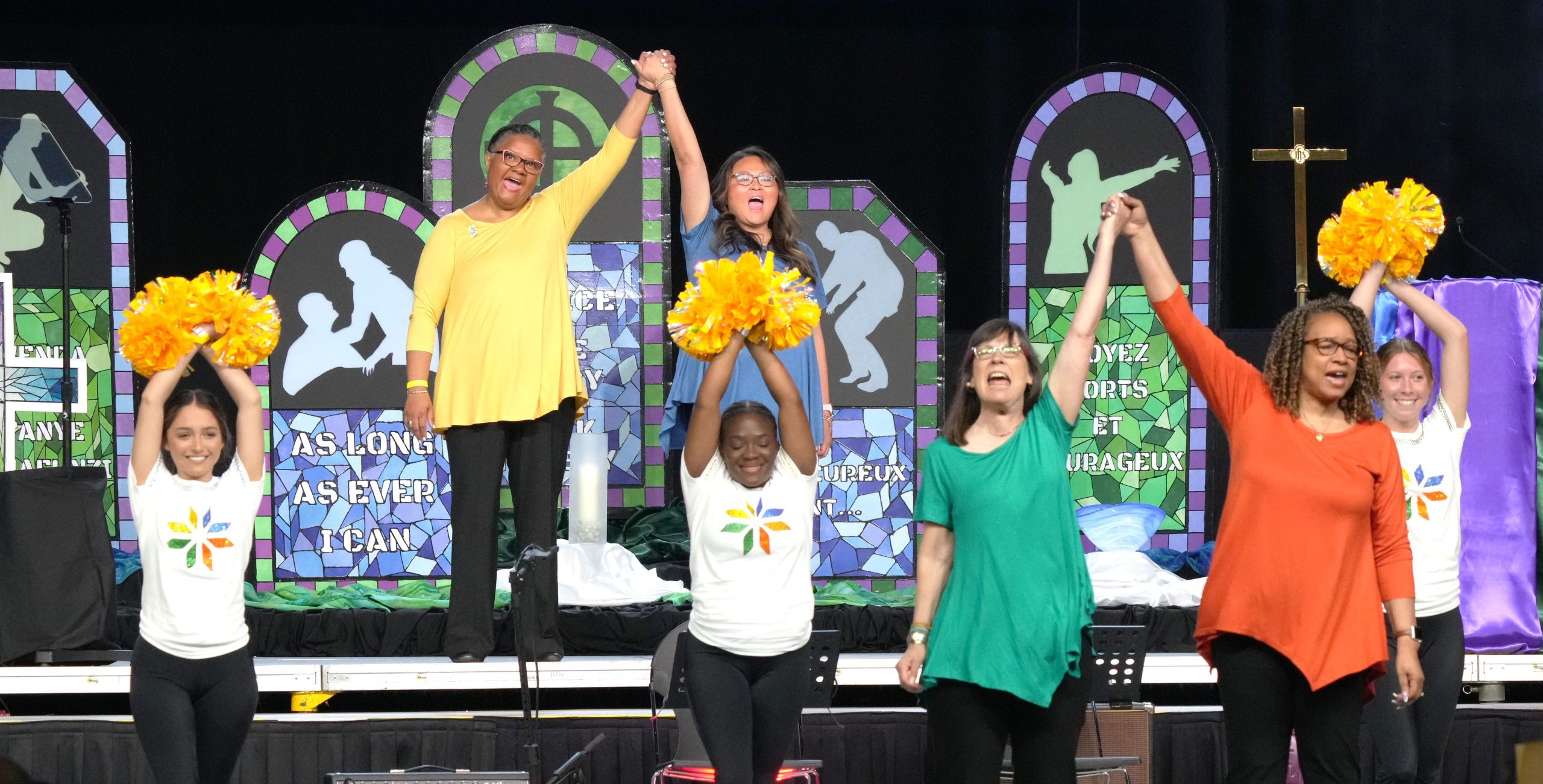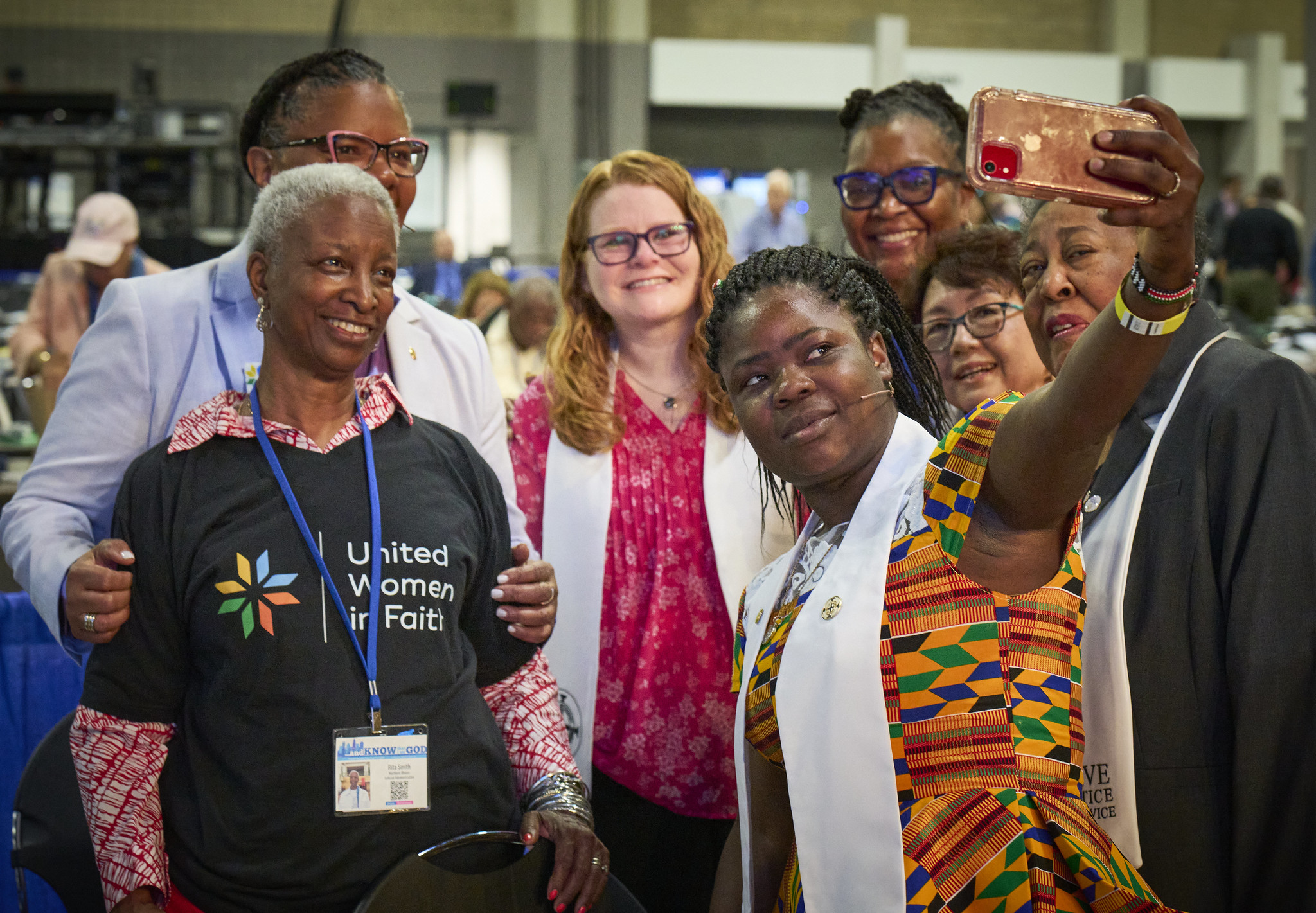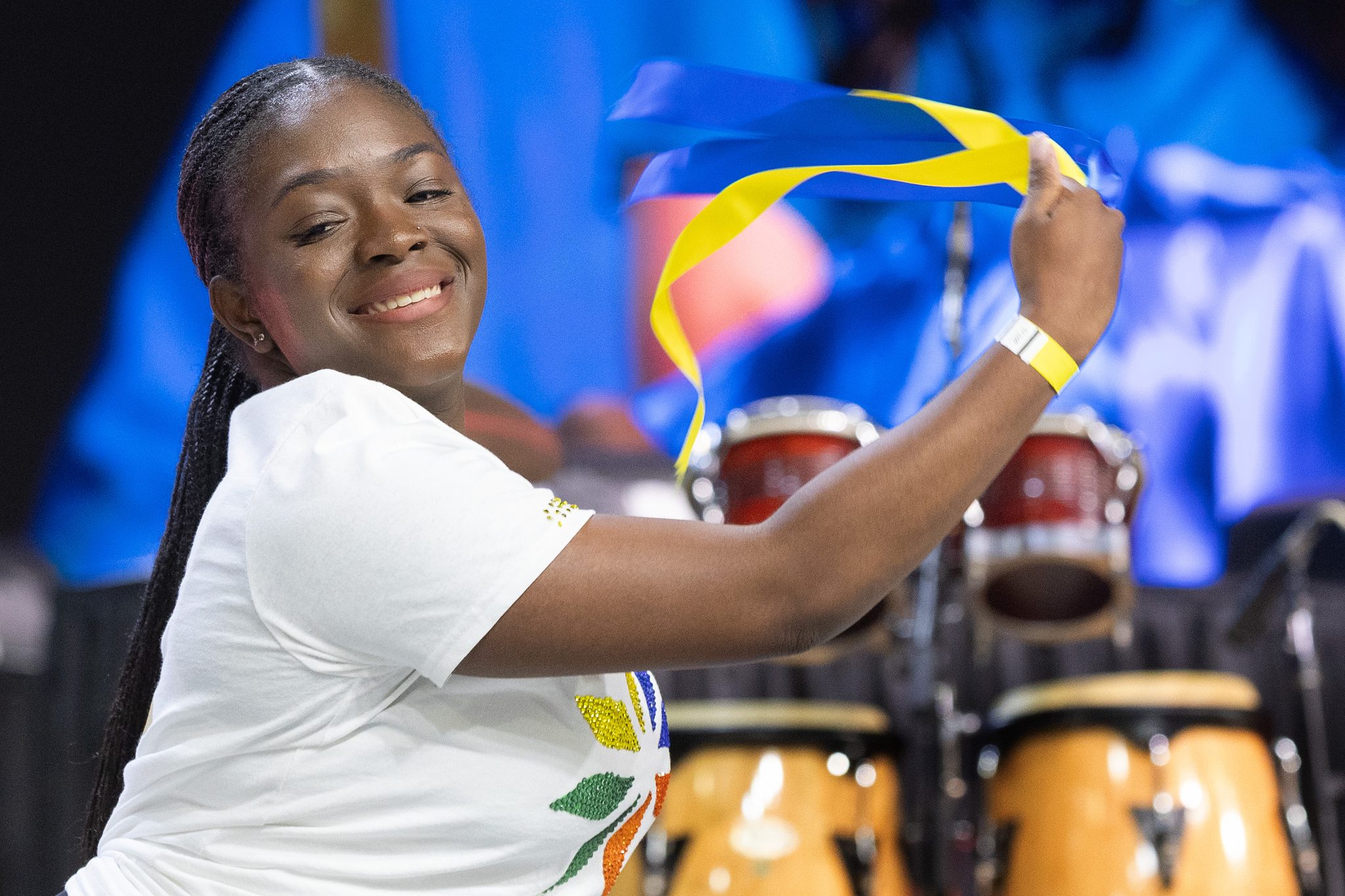
General Conference
United Women in Faith Makes its Presence Known at General Conference 2024
by Tara Barnes
The United Methodist General Conference met April 23 to May 3 in Charlotte, North Carolina. For 11 days, more than 700 elected delegates from around the world reviewed more than one thousand petitions focused on how The United Methodist Church wants to be God’s love in the world. Delegates met in legislative committees the first week then as a full body the second to address together the legislation that passed committee.
The General Conference is the denomination’s top policymaking body and the only body that can speak for The United Methodist Church.
The time together also included worship, communion, prayer, meals, exhibits, missionary commissioning, deaconess and home missioner consecration, actions, vigils, and other ways United Methodists come together as a body as part of the church’s mission to make disciples of Christ for the transformation of the world.
United Women in Faith legislation
United Women in Faith submitted 19 petitions to General Conference. These included calls to action on racial and climate justice, gender equity, protecting the girl child, and supporting deaconesses and home missioners. Eighteen of our petitions passed on consent calendar, meaning they received 10 or fewer “no” votes in committee.
“We commend the church for uplifting women, children, and youth at the 2024 General Conference,” said General Secretary and CEO Sally Vonner. “When women’s voices are heard, positive changes follow.”
Our petition seeking annual conference voting rights for retired deaconesses and home missioners missed the two-thirds majority required by less than 4 percent.
Included among our petitions were those uplifting women and children, protecting voting rights, and our historic Charter for Racial Justice.

Check out photos of United Women in Faith members at General Conference 2024 on the United Methodist Communications Flickr page. Click on the photo to visit!
Major legislative actions
The headlines to come out of this United Methodist General Conference are different than those in years past. This year United Methodists, by a large majority, lifted the bans on gay clergy and same-sex wedding ceremonies and removed the antigay language from our Social Principles. They also approved regionalization, a denominational restructuring plan to help de-center the United States and bring more parity to the church’s decision-making.
Progressives, centrists, and traditionalists also came together to say no to any further form of disaffiliation.
The voting numbers showed that The United Methodist Church is no longer a church divided.
“I am a traditionalist in my theology who has chosen to remain United Methodist,” said the Rev. Pamela DeDea of United Methodist Temple in Lakeland, Florida. “I attended General Conference because I wanted to know firsthand how I would be received as traditionalist. I was welcomed just as Jesus welcomed everyone. I was and have been treated with respect by my progressive colleagues.
“Jesus gave us some commands to live by: Love God with all your heart, mind, soul, and strength, and love one another as I have loved you,” she continued. “I will continue to pray for my friends and colleagues who have left The United Methodist Church. I pray for God’s peace and joy to flood all of our hearts and souls. I pray that we will all move forward being about God’s mission and ministry making disciples for Jesus.”
The words “gender” and “ability” were added to the church’s constitution as attributes for which members could not be excluded. Language to more directly renounce racism and live as an antiracist institution was also added to the denomination’s constitution. The General Conference also declared domestic violence a chargeable offense and passed and read apologies to survivors of sexual misconduct in the church and for the role of Methodists in the overthrow of the kingdom of Hawaii in 1893.
United Women in Faith also celebrates the support of petitions submitted by fellow agencies, racial and ethnic ministry plans, those working for creation justice, and other groups and individuals aligned on the causes of racial and climate justice and gender equity. General Conference approved a Caretaker of God’s Creation coordinator at each annual conference, environmentally friendly land use of church and conference property, continued and new statements against child incarceration and corporal punishment, support for reparations and affirmative action, ongoing repentance and reconciliation with Native Americans, and the addition of domestic violence as a fireable offense for leaders in the church, among many other promises to move closer to beloved community.
You can read more about delegates’ legislative decisions on the General Conference website.
All worship services and plenary sessions from the 2024 General Conference can be found on the General Conference website, including our April 29 consecration of deaconesses and home missioners and plenary presentation.

We begin now as well the work toward ratification of regionalization. All voting members of every annual conference will vote on the constitutional amendments needed to accomplish this needed change to how the church is organized. These votes will likely not occur until the fall of 2024 and spring 2025. United Women in Faith will keep you engaged and informed as we work for this together.
In addition to passing legislation, delegates also heard reports, voted on the denomination’s budget, and elected the secretary of the General Conference, bishops and bishop nominees who will serve on general agency boards, and members of the Commission on the General Conference, Interjurisdictional Committee on the Episcopacy, Judicial Council, University Senate, and Standing Committee on Central Conference Matters.
Our own Harriett Olson, former CEO and general secretary of United Women in Faith, was elected to Judicial Council, members served as legislative committee chairs, and many of our members will now also serve on the Interjurisdictional Committee on the Episcopacy.
This General Conference even featured a “love train.”
“I feel like we can finally say with authenticity that we’re a church of open minds, open hearts, and open doors,” said United Women in Faith member Christina Krost, longtime climate justice advocate and General Conference delegate from the Illinois Great Rivers Conference.
Krost also acknowledged the heartache of the slim loss of voting rights for retired deaconesses and home missioners.
“We have work to do to help the church understand, uplift, and affirm the work of our deaconesses and home missioners,” she said.
Work yet to be done
Missing the opportunity to give retired deaconesses and home missioners a vote as such at annual conferences showed us the church needs a little more help understanding and supporting the important work of laity in ministry and leadership.
“Methodist deaconesses have been in faithful, lifelong ministry since 1888, predating The United Methodist Church itself,” said Deaconess Dr. Katelin Hansen, chief financial officer for Church and Community Development for All People in Columbus, Ohio, a United Women in Faith-related national mission institution. She was also a General Conference delegate from West Ohio and a member of the Queer Delegate Caucus.
Deaconesses and home missioners are part of an order of The United Methodist Church, one of three orders in the denomination and the only lay order.
“It is important that we have voting parity with the other two orders of our denomination,” Hansen said.
Deaconesses and home missioners are theologically and vocationally trained laypeople who commit their lives to The United Methodist Church. They take a vow to alleviate suffering, eradicate causes of injustice and all that robs life of dignity and worth, facilitate the development of full human potential, and share in building global community through the church universal.
“I have been participating in General Conference for the past 20 years,” said Deaconess Dr. Judith Pierre-Okerson, General Conference delegate from the Florida Conference and chair of the Independent Commissions legislative committee. “The postponed 2020 General Conference has been the most holy conference I have experienced. I am happy with what the delegates accomplished in Charlotte, and I have great hope for our denomination. However, we should not be complaisant, as there is much more work to do before we become a truly inclusive Church.”
In another close vote, a minority report from Fossil Free UMC to encourage United Methodist organizations to avoid investments in fossil fuels was referred to the General Council on Finance and Administration instead of receiving a floor vote. It missed the floor in the conference’s very final minutes by only 12 votes.
At its April 2024 board meeting, United Women in Faith voted to support adding language to ¶717 of the Book of Discipline to exclude fossil fuels from United Methodist Church investments, and the board is encouraging Wespath to create a fossil free investment fund.
“Momentum for fossil fuel phase out is on the rise and is more imperative than ever,” said Ilka Vega, United Women in Faith’s executive for economic and environmental justice. “We have the opportunity to stop fueling global warming and direct our investments to fund a more sustainable future. This General Conference, the movement for Fossil Free UM joined the voices of international delegates and youth asking the church to show real action toward addressing the climate crisis and its disproportionate impacts on marginalized communities, the Global South, and young and future generations. While the legislation didn’t move this time at the speed of the urgency we need, together along with United Methodist Creation Justice Movement leaders and many advocates we have moved the needle and will continue pushing forward.”
While together in Charlotte, United Women in Faith also partnered with Creation Justice Ministries, the Love Your Neighbor Coalition, and the General Boards of Church and Society and Global Ministries for an Earth Day vigil at First United Methodist Church Charlotte. You can read about that moving event on our blog.
Bringing women together
In the leadup to General Conference, United Women in Faith joined the General Commission on the Status and Role of Women to host two women’s briefings, one for central conference women delegates on Saturday April 20 and a second for all women delegates Monday April 22.
The briefings were a chance for the women to meet one another and share their experiences and stories.
“As a General Conference delegate, you can and you will make an impact here,” Vonner said during the Monday gathering. “Let your voices be heard and your leadership be bold.”
The briefings helped set the stage for ongoing collaboration throughout the conference. The time together featured panels and testimonies and table discussions by legislative committee so women delegates could work to support one another.
Together delegates celebrated the women bishops elected in November 22, notably Bishop Ruby-Nell Estrella, the first woman elected bishop in the Philippines, and Bishop Dolores Williamston, the first Black woman elected to the South Central Jurisdiction in the United States. Participants also celebrated the election of Bishop Tracy S. Malone the next president of the Council of Bishops, the council’s first Black woman president.
“I had a lot of hope heading to General Conference for our church’s future, and I was not disappointed,” said Rita Smith, member of United Women in Faith’s program advisory group and a General Conference delegate from Northern Illinois.
She named leading the call to worship during the May 1 morning worship as one of her highlights. “‘This is the day the Lord has made. Let us rejoice and be glad in it!’ And indeed it was a glorious day,” she said. “I was so proud of Harriett’s election and of our Earth Day event as well. Our work continues with love in action.”
During the central conference women’s briefing Deaconess Jenn Ferariza Meneses named the power of women’s collective voices.
“The presence of our 20 Filipina delegates that we have here is a result of a longtime struggle for women’s leadership and inclusion,” said Meneses. “Our presence here, as women leaders of our church, is an expression of our collective struggle and our collective action.”
Women’s representation at General Conference increased from 36 percent at the 2016 and 2019 General Conferences to 42 percent at the 2024 meeting of the postponed 2020 General Conference.
What’s ahead
In the first break after the lifting of the gay clergy ban, members of the Queer Delegate Caucus gathered apart outside the bar of the conference to embrace, celebrate, and sing. Supporters gathered around them. As staff of United Women in Faith stood among those honoring the historic moment, a woman came up to us and said, “This is what it felt like when women got ordination.”
What a gift the United Methodist Church received then. What a gift The United Methodist Church has received now.
“General Conference was a watershed moment for The United Methodist Church. We finally banished decades of legislated harm against LGBTQ+ persons from our Book of Discipline,” said Home Missioner Helen Ryde. “And yet in many ways this watershed moment feels like a starting line. In contextually appropriate ways, our future must include denomination-wide education and invitation about what it looks like for us to live into the decisions we just made.”
This moment is an opportunity to grow and learn and listen and wait for the Spirit to both settle and move us, together. We are a church that has come together to take care of one another, even when we disagree.
“We are a 155-year-old movement of laity, inspiring and influencing women to grow spiritually and intellectually, be leaders in the church and beyond, and create a supportive fellowship to impact local and global communities,” said Vonner. “We advocated and created ways for women to be involved as missionaries and deaconesses and led and supported efforts for women to be seated at General Conference, ordained as clergy, and elected bishops; and we have continuously called the church to the work of racial justice.
“Today we continue to show up, say yes to God, and tackle the hard work of the world to transform lives of the most vulnerable, particularly women, children, and youth. We believe love in action can change the world.”
You can read more stories from General Conference on our blog, and be sure to subscribe to response magazine so you do not miss our special issue on General Conference.
Then on May 23 at 8 p.m. (ET) join us for our General Conference virtual town hall.
Thank you for your continued support for United Women in Faith.
Tara Barnes is director of denominational relations for United Women in Faith.
Cover photo by Larry McCormack for United Methodist News.

